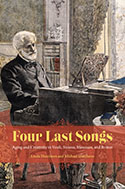
Four Last Songs: Aging and Creativity in Verdi, Strauss, Messiaen, and Britten
Aging and Creativity can seem a particularly fraught relationship for artists, who often face age-related difficulties as their audience’s expectations are at a peak. Four Last Songs explores this issue through the late works of some of the world’s greatest composers.
Giuseppe Verdi (1813-1901), Richard Strauss (1864-1949), Olivier Messiaen (1908-92), and Benjamin Britten (1913-76) all wrote operas late in life, pieces that reveal unique responses to the challenges of growing older. Verdi’s Falstaff, his only comedic success, combated Richard Wagner’s influence by introducing young Italian composers to a new model of national music. Strauss, on the other hand, struggling with personal and political problems in Nazi Germany, composed the self-reflexive Capriccio, a “life review” of opera and his own legacy. Though it exhausted him physically and emotionally, Messiaen at the age of 75 finished his only opera, Saint François d’Assise, which marked the pinnacle of his career. Britten, meanwhile, suffering from heart problems, refused surgery until he had completed his masterpiece, Death in Venice. For all four composers, age, far from sapping their creative power, provided impetus for some of their best accomplishments.
Through its treatment of these composers’ final years, Four Last Songs prives a valuable look at the challenges—and opportunities—that present themselves as artists grow older
Table of Contents
- Setting the Stage
- Creative Responses to the Challenges of Aging
- Giuseppe Verdi (1813-1901): A Generational Tale of Cultural Nationalism
- Richard Strauss (1864-1949): A Life Review in Music
- Olivier Messiaen (1908-1992): Faith in God and Art
- Benjamin Britten (1913-1976): The Life Narratives of the Ever-Young “Working Composer”
- Conclusion: The Particularities of Aging and Creativity